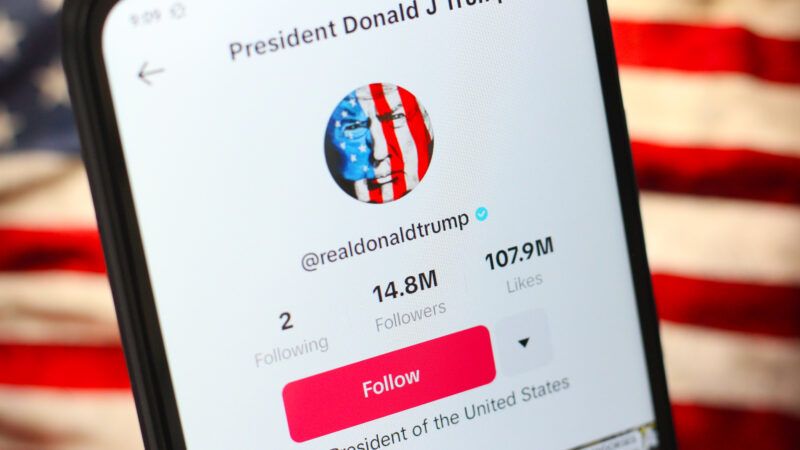TikTok Is Back Online as Trump Proposes Nationalizing It
While pledging to postpone the ban by executive order, the incoming president said the government should have a 50-percent ownership stake in the app.

Just hours after going dark, TikTok is back online—though nothing, legally, has changed.
Just after midnight on Sunday, the popular but maligned Chinese-owned app ceased operation in the United States; users logging on received a message that the service "isn't available right now" but "we are fortunate that President [Donald] Trump has indicated that he will work with us on a solution to reinstate TikTok once he takes office."
As it turned out, they didn't even have to wait for Trump's inauguration on Monday.
"I'm asking companies not to let TikTok stay dark!" Trump posted on Truth Social Sunday morning. "I will issue an executive order on Monday to extend the period of time before the law's prohibitions take effect, so that we can make a deal to protect our national security. The order will also confirm that there will be no liability for any company that helped keep TikTok from going dark before my order."
Early Sunday afternoon, the platform returned for U.S. users. "In agreement with our service providers, TikTok is in the process of restoring service," TikTok said in a post on X. "We thank President Trump for providing the necessary clarity and assurance to our service providers that they will face no penalties providing TikTok to over 170 million Americans and allowing over 7 million small businesses to thrive."
The law signed by President Joe Biden in April 2024, requiring TikTok to divest from Chinese parent company ByteDance or shut down U.S. operations, notably remains in effect—the only difference is that both the incoming president and the company at issue have each decided for the time being to pretend that it doesn't apply.
It's far from clear that Trump can accomplish his promise simply through an executive order. "A president…might tell the Department of Justice not to enforce the law for now, but he cannot suspend or delay the law itself," Walter Olson, senior fellow at the Cato Institute's Robert A. Levy Center for Constitutional Studies, tells Reason. "The law creates obligations not only for TikTok but also for third parties such as Google and Apple (re: distributing the TikTok app) and a president cannot necessarily shield them from all the possible consequences of breaking the law."
But Trump went further than simply pledging to bring TikTok back online, saying in his post on Sunday that the platform should be effectively nationalized, with American taxpayers owning half of it.
"My initial thought is a joint venture between the current owners and/or new owners whereby the U.S. gets a 50% ownership in a joint venture set up between the U.S. and whichever purchase we so choose," Trump wrote.
Trump's proposal effectively suggests he would be amenable to Beijing-based ByteDance retaining ownership, so long as that ownership is shared by the literal U.S. government.
The proposal puts a particularly ironic spin on the whole affair between TikTok and the federal government. Supporters justified the law on the premise that an app, even if privately owned, could not be allowed to operate in the U.S. if its parent company were based in China, a censorial authoritarian state that could force the platform to prioritize content it approved of.
In response, for the first time in American history, Congress singled out one company as forbidden by law to operate within its borders. And the solution, to get around the ban enforced by federal decree, is apparently for the platform to be jointly owned by the very government that banned it from operating there in the first place.


Show Comments (136)